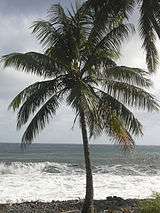Piʻilani
Piʻilani ("ascent to heaven"[1]) (born ca. 1577)[2] ruled as the 15th Mōʻī of the island of Maui in the later part of the 16th century. At the time Maui was an independent kingdom within the islands of Hawaii.
| Piʻilani | |
|---|---|
| Mōʻī of Maui | |
| Spouse | Laielohelohe Mokuahualeiakea Kunuʻunuiakapokiʻi |
| Issue | Lono-a-Piilani Kiha-a-Piilani Piʻikea, Chiefess of Maui and Hawaiʻi |
| Father | High Chief Kawaokaohele |
| Mother | Kepalaoa |
| Religion | Hawaiian mythology |
He was the first Alii to unite the island under a single line.[3] His rule was peaceful for most of his reign. His father was Kawaokaohele[4] and his mother was Kepalaoa.[5] Pilʻilani and his offspring are important in legends of Maui, in the same way that Liloa and his son ʻUmi-a-Liloa in the legends of the island of Hawaii.[4] The two family lines of Piʻilani and Liloa were closely associated although from separate islands. ʻUmi was a supporter of Kiha-a-Piilani, Piʻilani's son, when he went to war. The lineage continued in west Hawaii and east Maui in lesser lines and in the lines of Moana Kane from Liloa and Piʻilaniwahine from Piʻilani in the couple's marriage and offspring.[6]
Piʻilani's father and grandfathers, came from western Maui. Under Piʻilani for the first time this family controlled the eastern side as well.[7] Piʻilani began building a roadway to encircle the entire island, the first such road in the islands. It was wide enough for eight men to walk beside each other. It was completed by his son. Some sections of Piʻilani Highway follow the old path. In places, the old stones are still visible.[8] After Piʻilani's death the line of succession became a struggle similar to that of ʻUmi and Hakua of Hawaii.[7]
Family tree
| Kahekili I, King of Maui | |||||||||||||||||||
| Kawaokaohele | |||||||||||||||||||
| Hauanuihonialawahine, Chiefess of Kauai | |||||||||||||||||||
| Piʻilani, Mōʻī of Maui | |||||||||||||||||||
| Kepalaoa | |||||||||||||||||||
| Piʻikea, Chiefess of Maui and Hawaiʻi | |||||||||||||||||||
| Kumalae, Chief of Hilo | |||||||||||||||||||
| ʻUmi-a-Liloa, King of Hawaiʻi | |||||||||||||||||||
References
- Piʻilani
- Piʻilani's family
- Glenda Bendure; Ned Friary (2008). Lonely Planet Maui. Lonely Planet. pp. 242–. ISBN 978-1-74104-714-1.
- Patrick Vinton Kirch (7 July 2012). A Shark Going Inland Is My Chief: The Island Civilization of Ancient Hawai'i. University of California Press. pp. 206–. ISBN 978-0-520-95383-3.
- P. Christiaan Klieger (1 January 1998). Moku'Ula: Maui's Sacred Island. Bishop Museum Press. ISBN 978-1-58178-002-4.
- Kanalu G. Terry Young (25 February 2014). Rethinking the Native Hawaiian Past. Routledge. pp. 48–. ISBN 978-1-317-77669-7.
- Patrick Vinton Kirch (2 November 2010). How Chiefs Became Kings: Divine Kingship and the Rise of Archaic States in Ancient Hawai'i. University of California Press. pp. 101–. ISBN 978-0-520-94784-9.
- Greg Ward (2001). Maui. Rough Guides. pp. 229–. ISBN 978-1-85828-852-9.
